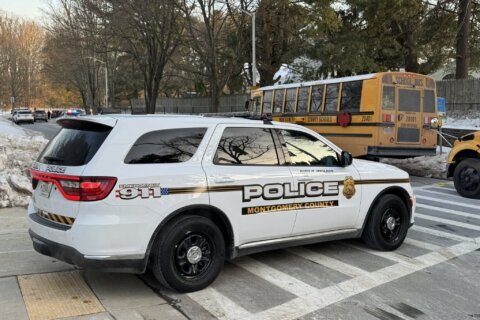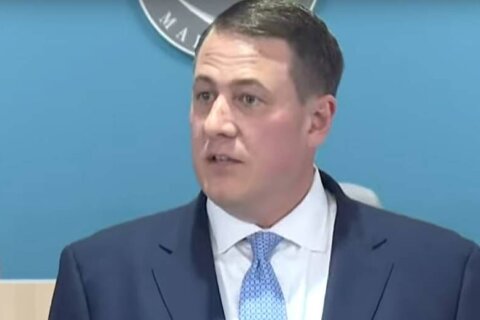This article was republished with permission from WTOP’s news partners at Maryland Matters. Sign up for Maryland Matters’ free email subscription today.
This content was republished with permission from WTOP’s news partners at Maryland Matters. Sign up for Maryland Matters’ free email subscription today.
More than six dozen business, labor and transportation organizations have banded together — under the leadership of one of Gov. Lawrence J. Hogan Jr.’s former top aides — to bolster public support for the controversial plan to build toll lanes along two Montgomery County highways.
Their organization, TrafficReliefNow.com, launched earlier this month. It is led by Doug Mayer, a political strategist who spent three years as Hogan’s top spokesman. His firm, Annapolis-based Strategic Partners & Media, handles Hogan’s political and issue advertising.
The group consists of chambers of commerce from around the state, construction trades unions and highway advocates.
It also includes several firms — including Accelerate Maryland Partners, Transurban, Macquarie and Dewberry — that the Maryland Department of Transportation has chosen to design the project.
However, several of the partner organizations initially listed on TrafficReliefNow’s website are not actual supporters of the group’s efforts. They were removed after Maryland Matters began making inquiries.
Bowie State University is one of them. The school’s director of university relations, Cassandra Robinson, said in an email: “We are looking into why our logo is being used on this site without our permission.”
Mayer subsequently removed five organizations from the list of sponsors: Bowie State University, The Center for Innovation & Entrepreneurship at Prince George’s Community College, the Capital Region Minority Supplier Development Council, People for Change Coalition and EMPLOY Prince George’s.
He blamed the groups’ inclusion on the initial list on an internal “miscommunication.”
Since 2017 Hogan has been pushing to build a new American Legion Bridge and add variably priced toll lanes to portions of the Capital Beltway and Interstate 270. The project would be privately financed; firms would recoup their investment through the revenue generated by the lanes, whose rates they would set.
Pointing to various public opinion surveys, Mayer said the project enjoys public support, but “it didn’t seem like it was organized enough and positioned in the right way to be effective.”
“It’s been difficult to watch the attempts at political sabotage around this project and the lengths that certain people have gone to end it,” he added.
Josh Tulkin, head of the Maryland chapter of the Sierra Club, rejected Mayer’s claim that toll lanes opponents are being “political.”
“The opposition to this project is based on specific environmental and economic concerns,” he said. “That opposition would be as strong regardless of who was advancing this project. One need only look at the level of opposition of similar groups to the ICC under [Gov. Martin] O’Malley (D).”
The I-495/I-270 project, which Hogan unveiled in 2017, has shrunk considerably over the years. Most of the changes have come in response to opposition from Montgomery County planners and elected leaders, as well as environmental groups. Comptroller Peter V.R. Franchot (D), a member of Board of Public Works, has also forced changes in the plan.
TrafficReliefNow launches at a pivotal time for the project.
A losing bidder has filed suit against the state over the decision to go with Accelerate Maryland Partners. Opponents of the project — led by the Sierra Club — have prepared a heavily-footnoted 183-page report with federal highway officials that foreshadows arguments likely to be made in a future lawsuit. In addition, Hogan must get the Board of Public Works to sign-off on a multi-billion dollar construction contract — a vote expected to be held just weeks before the 2022 election.
Because Hogan is term-limited and will leave office in 13 months, it makes sense for him to seek to bolster support for the project while the campaign to replace him is gaining steam, former Washington Post reporter and editor Robert McCartney said.
“He wants to make sure there’s a robust advocacy group pushing to protect this project — especially in case the next administration is less enthusiastic about it,” McCartney said.
“The project is quite advanced but there are various ways that opponents can stop it,” he added. “And he’s not going to be governor starting in the beginning of 2023.”
TrafficReliefNow.com is a 501(c)(4), meaning it doesn’t have to disclose expenditures or the source of its funding. But Mayer said the group will register as a lobbying organization, which will trigger twice-a-year disclosure requirements. “I think those disclosures are important,” he said. The next reporting requirement for lobbyists is in May.
Where is the group getting its funding? “We’ll have to see,” Mayer said.
The organization’s board consists of Ken White, a bank executive from Prince George’s County who heads the Maryland Black Chamber of Commerce, and Stephen Courtien, an Alexandria, Va. resident who leads the D.C.-Baltimore Building Trades Council. Mayer said additional board members will be added in the near future.
Mayer is also head of Fair Maps Maryland, a group formed to advocate on behalf of the redistricting proposals crafted by the Hogan-created Maryland Citizens Redistricting Commission. That group, which has a bipartisan board of directors, is also a 501(c)(4) and has not released a list of its donors.
Fair Maps Maryland — as well as Marylanders for Tax Fairness, a Mayer-formed group that advocated against Democratic proposals to raise revenue for education reform — is listed among the coalition supporters of the Traffic Relief Now effort.







